 I first thought about becoming a beekeeper after reading an article about how for the first time this year, the almond growers in California (who provide 80% of the world’s almonds) were struggling to find enough bees to pollinate the almond trees.
I first thought about becoming a beekeeper after reading an article about how for the first time this year, the almond growers in California (who provide 80% of the world’s almonds) were struggling to find enough bees to pollinate the almond trees.
I was surprised and started reading more. The articles were frightening. Since 1950 the population has decreased more than 50%.That means that the number of bees we have now is less than HALF of what we had in the 1950’s and we’re feeding THREE TIMES the number of people. Bees handle 80 percent of all pollination worldwide. Scary.
The more I read, the more frightening it all became. 3/4 of the food we eat is pollinated by bees. Yet, this CCD (Colony Collapse Disorder) was rampant, not only here in the U.S. but all over the world (although the rest of the world shows about 20-30% loss and we are showing 50-60% loss). There seem to be many theories about why – pesticides, drought, habitat destruction, nutrition deficit, air pollution, diseases, etc but most scientists seem to agree that the two most prominent causes appear to be pesticides and habitat loss.
So after all this reading I figured, “Hey, we have a bunch of land here, what would it take to help out a little and put up some beehives? Let’s help the little fella’s out.”
See? That statement is where it all started to go wrong.
First, bees are primarily FEMALES (like all really good, dependable, honest, trustworthy, charming, dedicated workers are – ah, but I digress) … and second of all, beekeeping isn’t as easy as just tossing up a few hives, wiping my hands off and calling it a day.
I have to be honest, that is really what I had hoped to do.
Ahh, but I was so naive and uneducated.
I think back fondly to those days (all of six months ago).
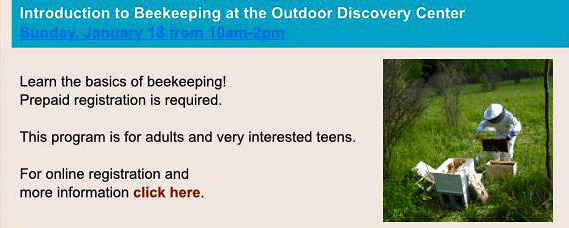
So, like all diligent, intelligent, good students, I decided to research beekeeping before jumping in – and low and behold an email hit my inbox about a seminar/class being given over at the Hudson Highlands Nature Museum. That sounded like a good start, so off I went.
The day long class was entertaining, educational, and informative and the instructor was educated, interesting and enthusiastic.
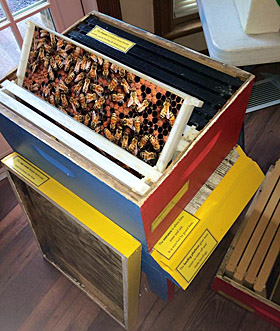 As the class went on throughout the day though, I started having the first inklings of “Um, what the heck am I thinking? This sounds really complicated.” But I retired two years ago and I felt it would be a good way to keep busy, and I am always up for a challenge, so I decided to go for it.
As the class went on throughout the day though, I started having the first inklings of “Um, what the heck am I thinking? This sounds really complicated.” But I retired two years ago and I felt it would be a good way to keep busy, and I am always up for a challenge, so I decided to go for it.
With that I jumped in and purchased my first hive and beekeeping equipment.
It was only January, but what an exciting box to open when it all arrived.
As I looked at all the parts though, I realized I had very little idea what the heck all of this was for.
OK, clearly I need more education.
I purchased Beekeeping For Dummies and started attending online webinars on beekeeping and this is where it really got intense. The more I learned, the less I felt like I knew. Wow. There was so much to this. No more gleeful, prancing, sugar cane visions of happy bees in my yard, flying up to deliver honey to my doorstep each morning and thanking me for their beautiful hive.
This was going to be work; and a lot of it.
I learned that there are about a million different types of hives – ok, well, like six, but it seemed like a million at the time…and dozens upon dozens of bee diseases that the bees could and would get, and tons of preemptive things I needed to do at certain times, during certain seasons, with certain products, to make sure that none of these bad things happened. And then I learned that even if I did all these preemptive things, my bees could still die, swarm, move out, leave, hitch a ride to a better beekeepers yard, or get diseases.
Great.
So I said to myself “Self…you need more information. Get on Facebook and talk to beekeepers.”
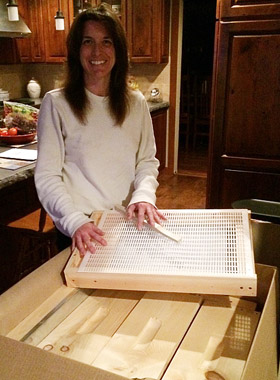 So since I am usually GREAT at giving advice – ask my husband, I can often be found giving very unsolicited, but in my mind VERY CRITICAL advice to him as he works on projects around here, or just folds clothes or drives the car – whatever – the point is I’m an expert advice giver so I took my advice.
So since I am usually GREAT at giving advice – ask my husband, I can often be found giving very unsolicited, but in my mind VERY CRITICAL advice to him as he works on projects around here, or just folds clothes or drives the car – whatever – the point is I’m an expert advice giver so I took my advice.
I found about a dozen good beekeeping Facebook sites and joined them.
That’s where things REALLY, REALLY became interesting.
This is where I found out that you will offend half the population of beekeepers if you call yourself a “beek” instead of beekeeper.
And that “honeybee” and “honey bee” are argued correct or incorrect at LENGTH with articles and policy and legal notices…oiy.
But even worse than all of that, I learned that queen excluders should DEFINITELY and ABSOLUTELY be used in ALL hives and that queen excluders are hated by bees and will kill and damage your bees and should NEVER, EVER, ever be used.
I learned that bees HATE plastic foundation and will ONLY be happy bees if given wax foundation, and I learned that plastic foundation is absolutely fine and the bees do perfectly well on it.
I learned that you should never, EVER put chemicals in your hives like mite-a-way strips (I hope you’re paying attention because these are some of the diseases and problems I’m going to have with my hives….damn it did I just say HIVES?? PLURAL??? Sigh) or oxcylic acid – because that’s part of the problem, and I learned that if I don’t do that and use those chemicals that I totally suck as a beekeeper and I’m the reason everyone else in the area will have mites and my bees will die a horrible death.
I learned that you should definitely feed sugar water when starting a new hive, or in the spring, and I learned that sugar is poison and should never be used.
I learned that langstroth hives are the best hives for new beekeepers and that langstroth hives are the hives of the devil and should never be used.
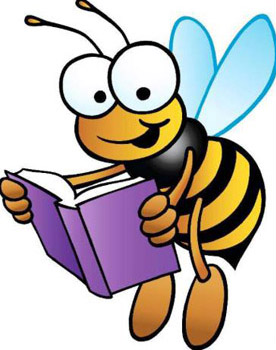 I learned I should never just have ONE hive, I need at least two – and then I learned that two is nothing, if I have two then I absolutely must have the hardware for FOUR because eventually they will swarm or need to be split and I’m a total loser if I don’t have enough hives to handle that and I have no business being a beekeeper.
I learned I should never just have ONE hive, I need at least two – and then I learned that two is nothing, if I have two then I absolutely must have the hardware for FOUR because eventually they will swarm or need to be split and I’m a total loser if I don’t have enough hives to handle that and I have no business being a beekeeper.
Sob.
So I tentatively started posting questions on things that made no sense to me, or things I was trying to better understand, and I was met with either complete kindness, compassion and ‘welcome to the fold” or I was met with derision, disgust, and I should throw myself off a bridge before ever considering bees, because I’m clearly an idiot.
Whew.
So one person suggested that finding a local bee club would be a great place to start so I reached out to the most local and was met with coldness and very little help. That was a bummer. But then one of the guys on the Facebook pages reached out to me and said “Hey – you’re local to me! You should come to our next beekeeping meeting.” The first one or two I couldn’t make, but this guy that I’ll call Dave (because that’s actually his name) kept with it, and every month, a few days before the meeting, he would remind me and invite me along.
So even though this club wasn’t as close to me as the other one, I drove the distance and was really pleasantly surprised. The people were super nice and the president gave a really interesting seminar on splitting hives and some new devices he’d developed. It was really impressive, and interesting, and I joined the club that night. Dirt cheap too! Something like $20 for the YEAR and that included the “family” although frankly if I ever get my husband to one of the meetings I’ll be a bit surprised. But that doesn’t matter, technically he is already a member of the club. So. There. I’m thinking he just needs some more of my advice to get going.
So I met Dave there and we exchanged numbers because he is a really nice guy and although he is somewhat new too, he seems fairly intelligent, his bees all survived the winter (which as a newbie with all this reading under my belt I was SUPER impressed with) and right now I’m sure Dave completely regrets that decision as I text him constantly asking if “this is normal” or “why does this bee look like this” and “hey look at this frame, what the hell is that stuff at the top????”. Poor Dave. Because he is really a saint and quite patient. I can only wonder what his wife thinks as he gets 400 messages a week from some woman from the bee club, but I really can’t think about that too much…I need some damn answers, man. So…thanks Dave.
So, ok, I am eagerly anticipating my first bee meeting and I show up early and they have tea and coffee and donuts and stuff, and damn I’m hungry so I scoff down a couple of donuts and then wonder, since I’m not a member yet if I should really have done that because maybe they’re just for members, but look – I’m stressed. I have an empty hive – I am picking up bees in a week and I need energy, ok? So I eat the donuts (somewhat guiltily) and decide to make myself a cup of tea. So here, at my first beekeeping meeting – it HAPPENS. I almost get ejected.
Why?
WHY?
Well, calm down, I’ll tell you.
Because the urn with the hot water had not been plugged in and I had put honey in my cup, and the tea bag and then added the room temperature water. When I realized it wasn’t hot, I put the cup into the microwave. Yep. There it was.
So now all the AVERAGE human beings are going “WTF?? So what?” right now, but BEEKEEPERS are all slapping their palms into their heads and going “YOU IDIOT!!!!”.
You see, you should NEVER heat honey past 90 degrees. It ruins all the beneficial effects of honey. EVERY beekeeper knows that and I’m in a room filled with about 60 of them.
The whole room goes silent as they all turn their heads to stare at me and the ticking microwave. Some of their heads completely spin around 360 degrees. And one clearly disgusted man says to me… “You know….you should never, ever do that to honey. The bees work hard to make that, it’s insulting to them to just destroy it like that.”
OK, maybe that’s a slight exaggeration. Maybe the guy just said “hey you should never heat honey, it ruins the properties” and maybe not too many other people noticed, but whatever. That’s how it felt.
So I take my ruined honey tea and go sit down, hoping everyone is not pointing and taking a vote to oust me before I even become a member.
Luckily I get through that night.
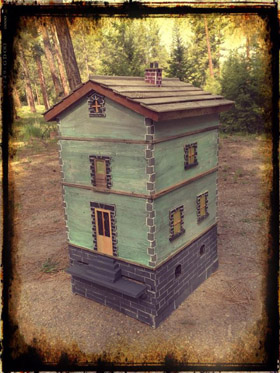 Later that week I’m home and I see someone post the most darling picture of a beehive and I know then and there that I MUST HAVE THAT.
Later that week I’m home and I see someone post the most darling picture of a beehive and I know then and there that I MUST HAVE THAT.
It’s AWESOME!!
It’s SPECTACULAR!
It’s AMAZING!
It’s SO CUTE!!!
(It is also functional but impractical – because as I add supers to it, the look will totally be ruined. WhatEVER!!)
I immediately buy it.
Look at how cute it is.
It doesn’t matter that I have no bees for it, it’s like buying a pair of really cute shoes that you don’t have an outfit to match. That is IRRELEVANT. Look at how CUTE they are!
So you see where this is going right?
I don’t even have my first set of bees and I already have TWO hives.
This beekeeping is a disease. It is like an addiction or something. I can see myself in some psychiatric ward in the future screaming to the nurse “DON’T PUT THAT HONEY IN THE MICROWAVE YOU IMBECILE!! DO YOU KNOW HOW MANY FLOWERS A BEE HAS TO VISIT TO MAKE THAT ONE TEASPOON?? DO YOU? DO YOU, YOU INGRATE!???
Well the answer to that is it takes 500 flowers and twelve honeybees to make that one teaspoon of honey. A bee has to visit about two MILLION flowers to create one pound of honey. And did you also know that the brain of a worker honey bee (or “honeybee” – only god knows which is correct, or whichever beekeeper you happen to ask, of course will tell you for sure) is about a cubic millimeter but has the densest neuropile tissue of any animal? Well DID YOU?? Well now you do. This is the kind of stuff my head is filled with now.
Yeah. I didn’t know any of this six months ago either, but damned right I do now!
So now I have two hives and no bees yet, and I start looking for my second set of bees (because you kind of have to PRE order them to get them in the spring) and Dave gives me some great leads but in the end I decide – “Hey, I am NOT crazy like these other beekeepers. Next year I will probably need to split my hive to keep them from swarming (are you noticing how brilliant I am becoming??) and if I do THAT then what will I put my split in? I will have to buy hive THREE!! So at the last second I decide – “NO, NO…I will stick with one populated hive and one empty hive.”
And one of the beekeepers, who was helping me find another set of bees, emails this to me when I say I’m going to wait, because I really don’t want a whole bunch of hives:
Kerry, I clearly remember saying the exact same thing years ago. Now, I’m up to my ears with the little dears and I’m president of a bee club. I’m willing to bet that you’re the future president of BOS! 🙂
HaHaHaha.
Funny guy.
Right now he is probably in a psychiatric ward, screaming at some nurse about the benefits of honey.
OK, so in addition to reading books, and attending meetings and being a member of 2000 beekeeping Facebook sites, I also receive bee magazines. Yeah. So at the bar some night, don’t be surprised to see me quoting from Bee Culture, ok? Just pretend to be interested. I’ll move on in a few minutes. I mean I’ll move on to the latest bee book I’m reading.
I don’t understand why none of my friends seem to want to go out anymore.
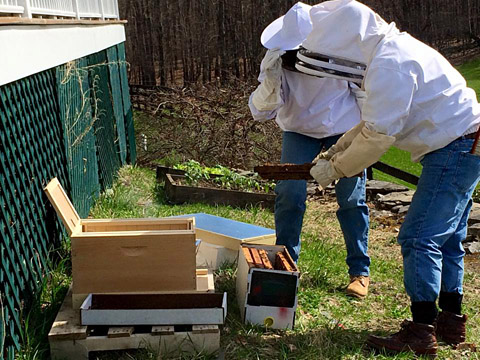
Well, anyway, as complicated as all this sounds, I DID successfully install my first NUC (which is a little box of bees complete with brood (baby bees), and a queen, and everything they need to be a good and healthy colony of bees), and I can literally spend HOURS watching them. Filming them. Taking pictures of them. Studying them. Asking Dave about them. Forcing my husband to listen to my stories about my day of watching them, and studying them, and photographing them.
Of course I still feel like every single thing I do will kill my bees, and that every single thing I neglect to do will kill my bees.
I’ll let you know how it all works out.
Or…you can just come visit me in the psych ward.
I hope they’ll let me bring my bees.
Recent Comments